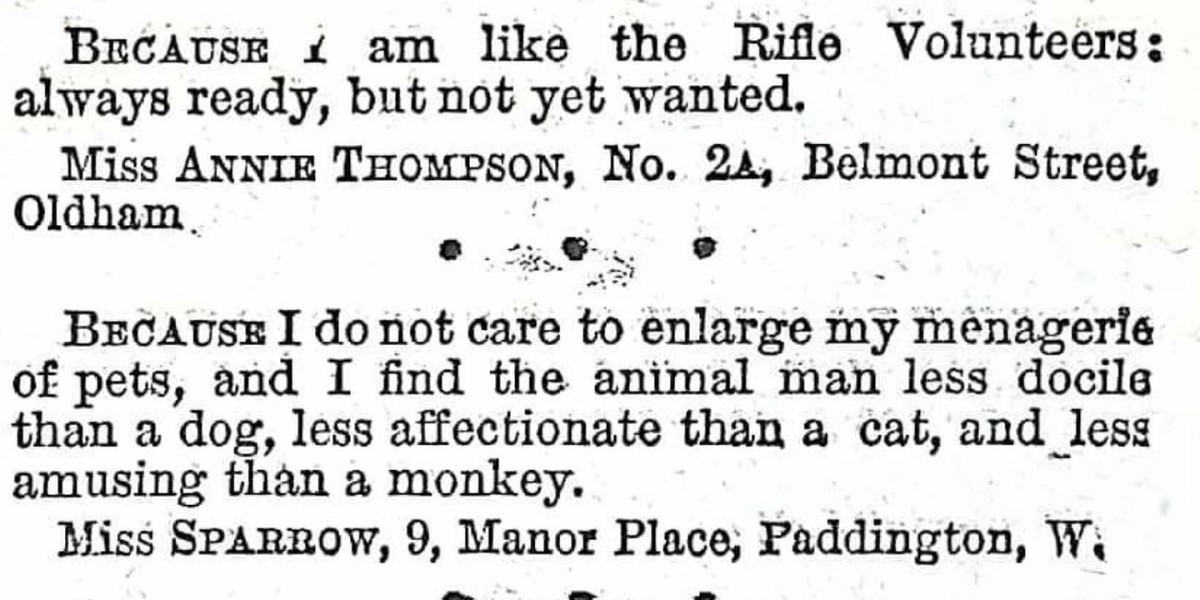Introduction: In the late 19th century, as societal norms and expectations were undergoing transformations, the term "spinster" carried both weight and wit. A 1889 article from the British weekly magazine, Tit-Bits, invited single women to answer the question, "Why am I spinster?" The responses, often laced with humor and astute observations, provide a captivating glimpse into the perspectives of unmarried women of that era. Let's journey through time and explore some of these delightful and thought-provoking answers.
The Multifaceted Dairymaid: "I am now only a dairymaid. If married I should be wife, mother, nurse, housekeeper, chambermaid, seamstress, laundress, dairymaid, and scrub generally." This response humorously highlights the myriad roles that marriage might entail, contrasting them with the simplicity of being a dairymaid.
The Menagerie Metaphor: "I do not care to enlarge my menagerie of pets. I find the animal man less docile than a dog, less affectionate than a cat, and less amusing than a monkey." Comparing potential partners to pets, this response humorously captures the complexities and idiosyncrasies of human relationships.
Choosing Alternative Professions: "I have other professions open to me with shorter hours, more agreeable work, and possibly better pay." This pragmatic response reflects a woman's agency in choosing a path that aligns with her preferences and values, challenging societal expectations.
The Rarity of Good Men: "For good men are scarce, but fools there are plenty, that's why I am single at seven-and-twenty." This candid response speaks to the scarcity of desirable partners and the reluctance to settle for less.
Metaphors of Freedom: "Like the wild mustang of the prairie...I find it more delightful to tread on the verge of freedom and captivity than to allow the snarer to cast around me the matrimonial lasso." Drawing parallels with untamed creatures, this response celebrates the joys of maintaining independence and avoiding the matrimonial "lasso."
The Electric Battery Metaphor: "Matrimony is like an electric battery...once you join hands, you can't let go, however much it hurts." Using the metaphor of an electric battery, this response vividly illustrates the binding nature of marriage, suggesting that once embarked, one must endure the journey to its conclusion.
Fragility and Uniqueness: "Because (like a piece of rare china) I am breakable, and mendable, but difficult to match." This response poetically intertwines the fragility of human emotions with the uniqueness of an individual, portraying spinsterhood as a choice of preservation.
A Love Lost to Economic Realities: "John, whom I loved, was replaced in his office by a girl...He could not earn enough money to keep a home, so he went abroad; consequently, I am still a spinster." This poignant response sheds light on the economic realities that influenced romantic choices, highlighting the impact of external circumstances on personal relationships.
Conclusion: The voices of these unmarried women from the late 19th century, as expressed in response to the question "Why am I spinster?" reveal a rich tapestry of wit, pragmatism, and resilience. These women, in embracing or resisting societal expectations, left behind a legacy of insights that transcends time, offering us a window into the complexities of relationships and personal choices in an era marked by evolving norms.








